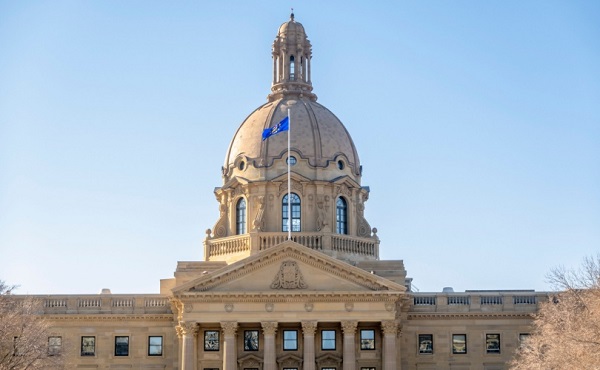Alberta
Male suspect involved in tragic incident between Beaumont and Edmonton sought by police; EPS release photos of suspect

News release from the Edmonton Police Service (EPS)
The Edmonton Police Service (EPS) is assisting the RCMP with the investigation into a tragic incident that claimed the life of an innocent woman last night on 50 Street.
Yesterday, Saturday, Feb. 24, 2024, at approximately 9:40 p.m. various EPS resources were deployed to the area of 50 Street and 22 Avenue SW at the request of the RCMP. It was reported to police that RCMP attempted to conduct a traffic stop on a suspicious U-Haul in Beaumont, when the vehicle fled. The U-Haul subsequently travelled north on 50 Street into Edmonton, where it struck and killed a woman inspecting the exterior of her vehicle. Moments later the U-Haul came to rest just outside a gas station off of 22 Avenue and 50 Street.
After crashing the U-Haul, the male suspect then reportedly stole a Honda Civic that was parked outside the gas station with a child inside. Police did consider an Alert to the public at the time, though thankfully the child was located unharmed in the area of 66 Street and 25 Avenue minutes later. The suspect then fled the scene in the Honda Civic. The stolen vehicle has since been recovered outside of Edmonton.
The EPS and RCMP continue to actively seek the identity and whereabouts of the male suspect described as being approximately 5’11” who was last seen wearing a black hoodie with white text on the front, brown shorts and black shoes. CCTV photos of the suspect are included below.
“We are incredibly saddened to hear about the tragic death of the innocent woman who was killed on 50 Street,” says Det. Nigel Phillips with the EPS Investigative Response Team. “Our hearts are with her family and friends who will now have to carry on with this unfathomable loss.”
“We are doing everything we can to track down the suspect and we trust the public will help us identify and locate him as soon as possible.”

Assist to identify and locate: Male suspect running in area of 50 Street & 22 Avenue SW
Anyone with information about the suspect’s identity and/or their whereabouts is asked to contact the EPS immediately at 780-423-4567 or #377 from a mobile phone. Anonymous information can also be submitted to Crime Stoppers at 1-800-222-8477 or online at www.p3tips.com/250.
Alberta
B.C. would benefit from new pipeline but bad policy stands in the way

From the Fraser Institute
By Julio Mejía and Elmira Aliakbari
Bill C-69 (a.k.a. the “no pipelines act”) has added massive uncertainty to the project approval process, requiring proponents to meet vague criteria that go far beyond any sensible environmental concerns—for example, assessing any project’s impact on the “intersection of sex and gender with other identity factors.”
In case you haven’t heard, the Alberta government plans to submit a proposal to the federal government to build an oil pipeline from Alberta to British Columbia’s north coast.
But B.C. Premier Eby dismissed the idea, calling it a project imported from U.S. politics and pursued “at the expense of British Columbia and Canada’s economy.” He’s simply wrong. A new pipeline wouldn’t come at the expense of B.C. or Canada’s economy—it would strengthen both. In fact, particularly during the age of Trump, provinces should seek greater cooperation and avoid erecting policy barriers that discourage private investment and restrict trade and market access.
The United States remains the main destination for Canada’s leading exports, oil and natural gas. In 2024, nearly 96 per cent of oil exports and virtually all natural gas exports went to our southern neighbour. In light of President Trump’s tariffs on Canadian energy and other goods, it’s long past time to diversify our trade and find new export markets.
Given that most of Canada’s oil and gas is landlocked in the Prairies, pipelines to coastal terminals are the only realistic way to reach overseas markets. After the completion of the Trans Mountain Pipeline Expansion (TMX) project in May 2024, which transports crude oil from Alberta to B.C. and opened access to Asian markets, exports to non-U.S. destinations increased by almost 60 per cent. This new global reach strengthens Canada’s leverage in trade negotiations with Washington, as it enables Canada to sell its energy to markets beyond the U.S.
Yet trade is just one piece of the broader economic impact. In its first year of operation, the TMX expansion generated $13.6 billion in additional revenue for the economy, including $2.0 billion in extra tax revenues for the federal government. By 2043, TMX operations will contribute a projected $9.2 billion to Canada’s economic output, $3.7 billion in wages, and support the equivalent of more than 36,000 fulltime jobs. And B.C. stands to gain the most, with $4.3 billion added to its economic output, nearly $1 billion in wages, and close to 9,000 new jobs. With all due respect to Premier Eby, this is good news for B.C. workers and the provincial economy.
In contrast, cancelling pipelines has come at a real cost to B.C. and Canada’s economy. When the Trudeau government scrapped the already-approved Northern Gateway project, Canada lost an opportunity to increase the volume of oil transported from Alberta to B.C. and diversify its trading partners. Meanwhile, according to the Canadian Energy Centre, B.C. lost out on nearly 8,000 jobs a year (or 224,344 jobs in 29 years) and more than $11 billion in provincial revenues from 2019 to 2048 (inflation-adjusted).
Now, with the TMX set to reach full capacity by 2027/28, and Premier Eby opposing Alberta’s pipeline proposal, Canada may miss its chance to export more to global markets amid rising oil demand. And Canadians recognize this opportunity—a recent poll shows that a majority of Canadians (including 56 per cent of British Columbians) support a new oil pipeline from Alberta to B.C.
But, as others have asked, if the economic case is so strong, why has no private company stepped up to build or finance a new pipeline?
Two words—bad policy.
At the federal level, Bill C-48 effectively bans large oil tankers from loading or unloading at ports along B.C.’s northern coast, undermining the case for any new private-sector pipeline. Meanwhile, Bill C-69 (a.k.a. the “no pipelines act”) has added massive uncertainty to the project approval process, requiring proponents to meet vague criteria that go far beyond any sensible environmental concerns—for example, assessing any project’s impact on the “intersection of sex and gender with other identity factors.” And the federal cap on greenhouse gas (GHG) emissions exclusively for the oil and gas sector will inevitably force a reduction in oil and gas production, again making energy projects including pipelines less attractive to investors.
Clearly, policymakers in Canada should help diversify trade, boost economic growth and promote widespread prosperity in B.C., Alberta and beyond. To achieve this goal, they should put politics aside, focus of the benefits to their constituents, and craft regulations that more thoughtfully balance environmental concerns with the need for investment and economic growth.
Alberta
Alberta introduces bill allowing province to reject international agreements

From LifeSiteNews
Under the proposed law, international treaties or accords signed by the federal government would not apply in Alberta unless approved through its own legislation.
Alberta’s Conservative government introduced a new law to protect “constitutional rights” that would allow it to essentially ignore International Agreements, including those by the World Health Organization (WHO), signed by the federal Liberal government.
The new law, Bill 1, titled International Agreements Act and introduced Thursday, according to the government, “draws a clear line: international agreements that touch on provincial areas of jurisdiction must be debated and passed into law in Alberta.”
Should the law pass, which is all but certain as Alberta Premier Danielle Smith’s Conservatives hold a majority government, it would mean that any international treaties or accords signed by the federal government would not apply in Alberta unless approved through its own legislation.
“As we return to the legislature, our government is focused on delivering on the mandate Albertans gave us in 2023 to stand up for this province, protect our freedoms and chart our path forward,” Smith said.
“We will defend our constitutional rights, protect our province’s interests and make sure decisions that affect Albertans are made by Albertans. The federal government stands at a crossroads. Work with us, and we’ll get things done. Overstep, and Alberta will stand its ground.”
According to the Alberta government, while the feds have the “power to enter into international agreements on behalf of Canada,” it “does not” have the “legal authority to impose its terms on provinces.”
“The International Agreements Act reinforces that principle, ensuring Alberta is not bound by obligations negotiated in Ottawa that do not align with provincial priorities,” the province said.
The new Alberta law is not without precedent. In 2000, the province of Quebec passed a similar law, allowing it to ignore international agreements unless approved by local legislators.
The Smith government did not say which current federal agreements it would ignore, but in theory, it could apply to any agreement Canada has signed with the United Nations or the WHO.
-

 Business1 day ago
Business1 day agoCarney government risks fiscal crisis of its own making
-

 Alberta1 day ago
Alberta1 day agoB.C. would benefit from new pipeline but bad policy stands in the way
-

 Business13 hours ago
Business13 hours agoTrans Mountain executive says it’s time to fix the system, expand access, and think like a nation builder
-

 Frontier Centre for Public Policy1 day ago
Frontier Centre for Public Policy1 day agoChurches Are All That Stands Between Canada And Tyranny
-

 Alberta1 day ago
Alberta1 day agoAlberta introduces bill allowing province to reject international agreements
-

 Energy13 hours ago
Energy13 hours agoCAPP calls on federal government to reset energy policy before it’s too late
-

 Business2 days ago
Business2 days agoTrump Admin Establishing Council To Make Buildings Beautiful Again
-

 International2 days ago
International2 days agoUS Deploys Gerald Ford Carrier Strike Group To Target Cartels




